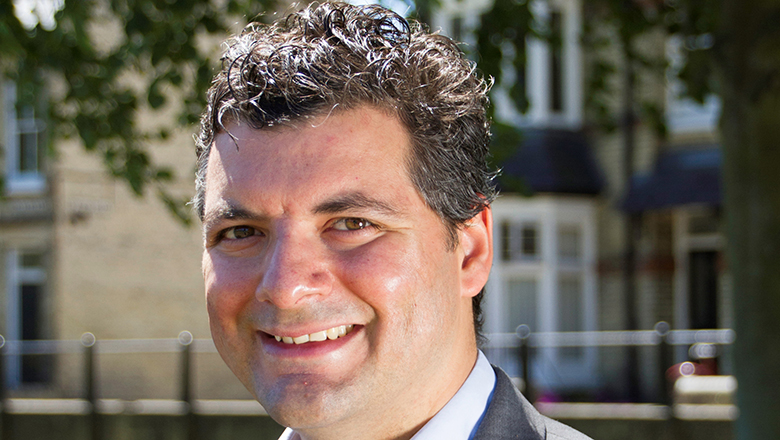The City Law School’s Dr Aldo Zammit Borda comments on the continued ‘invisibility’ of the situation in Xinjiang, China.
By City Press Office (City Press Office), Published
By Dr Aldo Zammit Borda, Reader in Law, The City Law School
For all the nice talk about human rights and accountability, on 6th October 2022, a majority of States at the Human Rights Council (HRC) voted against even debating – let alone investigating – the findings of the Office of the UN High Commissioner for Human Rights (OHCHR) on the situation in the Xinjiang, China.
 On 31st August 2022, minutes before her appointment as High Commissioner for Human Rights came to an end, the Office of Michelle Bachelet released its Assessment of Human Rights Concerns in the Xinjiang Uyghur Autonomous Region [XUAR], People’s Republic of China. Based on original interviews and research, as well as on official Chinese Government documentation and information, and civil society reports, the overall conclusion of this report was that: ‘serious human rights violations have been committed in XUAR in the context of the Government’s application of counter-terrorism and counter-“extremism” strategies’ (para. 143).
On 31st August 2022, minutes before her appointment as High Commissioner for Human Rights came to an end, the Office of Michelle Bachelet released its Assessment of Human Rights Concerns in the Xinjiang Uyghur Autonomous Region [XUAR], People’s Republic of China. Based on original interviews and research, as well as on official Chinese Government documentation and information, and civil society reports, the overall conclusion of this report was that: ‘serious human rights violations have been committed in XUAR in the context of the Government’s application of counter-terrorism and counter-“extremism” strategies’ (para. 143).
Indeed, the findings of the Office of the High Commissioner for Human Rights (OHCHR) are consistent with a growing number of reports on the subject that have consistently found evidence of atrocities in Xinjiang. These include the findings of the UN Special Rapporteur on contemporary forms of slavery, Tomoya Obokata, who found that Uyghurs, Kazakhs and other ethnic minorities were subjected to forced labour. Other reports, such as those of Amnesty International and Human Rights Watch have characterised these violations as crimes against humanity. And others, including the judgment of the Uyghur Tribunal, found that this was the crime of genocide.
Outright dismissal by China
However, faced with such serious allegations, China has simply dismissed the evidence and, indeed, rejected the very issuance of the OHCHR report, claiming it was based on disinformation and lies fabricated by anti-China forces.
Subsequently, the United States and Norway, with the support of several other Western States, introduced in the Council a draft decision L.6, entitled ‘Debate on the situation of human rights in the Xinjiang Uyghur Autonomous Region, China.’ The premise for this draft decision was that the very least that the HRC could do, in face of such mounting allegations and their outright dismissal by China, was to have a debate on the matter.
However, following a discussion within the HRC on 6 October 2022 – which lasted just over fifty minutes - the proposal to debate this matter was rejected with a vote of 19-17 against holding a debate on such serious allegations, with 11 States abstaining. As the various delegations requested to speak, it was the approach of Muslim States that was particularly noteworthy.
States such as Qatar, Indonesia and Pakistan did not support debating the allegations of violations against Uyghur Muslims. These States are all members of the Organisation of Islamic Cooperation (OIC), which had previously supported the Gambia in bringing a case at the International Court of Justice against Myanmar for the crime of genocide against Rohingya Muslims. The Gambia and other members of the OIC were praised for taking such action in support of the human rights of the Rohingya Muslims.
But the situation is very different with respect to the Uyghur Muslims. There are no mass killings of Uyghurs and, indeed, the Uyghur Tribunal found that it was a ‘silent’ biological, not physical, genocide that was occurring in Xinjiang (imposing measures intended to prevent births within the group). Moreover, the atrocities in Xinjiang were contained largely within the borders of China and did not spill over into neighbouring countries (unlike, for instance, the very visible refugee camps on the Myanmar/Bangladesh border). Indeed, the ‘invisibility’ of the situation in Xinjiang has remained, even as Chinese authorities have more recently started to dismantle the so-called re-education camps and to relocate inmates to forced labour or prisons without due process. These factors have enabled Chinese authorities to maintain a narrative of plausible denial, which Muslim States within the HRC (and others who wished to maintain a ‘business as usual’ approach with China) have found convenient to repeat.
Fragility of the regime
But the OHCHR findings of serious violations of human rights in Xinjiang and the HRC’s failure to even debate this matter will have repercussions for global human rights everywhere. The fact that a majority of Member States of the HRC, including Muslim States, voted not to debate these allegations and, consequently, to legitimize China’s narrative of denial, also legitimizes narratives of denial in the very heart of the United Nations: its Human Rights Council.
The failure of the debate on the debate at the HRC should serve as an eye opener to anyone about the fragility of the human rights regime and about how narratives of denial have not only made their way, but indeed prevailed, at the HRC - the very body of the UN established to, according to paragraph 2 of UNGA resolution 60/251, promote ‘universal respect for the protection of all human rights and fundamental freedoms for all.’
(Disclaimer: The author served as Head of Research and Investigation of the Uyghur Tribunal.)
